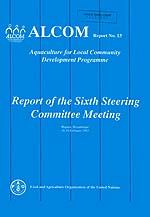 | ALCOM GCP/INT/555/SWE
Aquaculture for Local Community Development Programme GCP/RAF/277/BEL
ALCOM Report No. 13
Report of the Sixth Steering Committee Meeting
Maputo, Mozambique
16-19 February 1993
Funding Agencies :
SWEDISH INTERNATIONAL DEVELOPMENT AUTHORITY
BELGIUM ADMINISTRATION FOR DEVELOPMENT CO-OPERATION
Executing Agency :
FOOD AND AGRICULTURE ORGANIZATION OF THE UNITED NATIONS
Harare, Zimbabwe, April 1993.
|
| The designations employed and the presentation of the material in
this publication do not imply the expression of any opinion
whatsoever on the part of the Food and Agriculture Organization of
the United Nations concerning the legal status of any country,
territory, city or area or of its authorities, or concerning the
delimitation of its frontiers or boundaries. |
The designations employed and the presentation of material
in this publication do not imply the expression of any opinion
whatsoever on the part of the Food and Agriculture
Organisation of the United Nations concerning the legal
status of any country, territory, city or area of its authorities,
or concerning the delimination of its frontiers or boundaries.
PREFACE
This document is the adopted report of the Sixth Steering Committee of ALCOM
(Aquaculture for Local Community Development Programme). The meeting was hosted by
the Government of Mozambique, and was held in Maputo, Mozambique, from 16 to 19
February, 1993.
The document contains also the Progress Report for 1992, the Work Plan for 1993, and a
document discussing the future of ALCOM from 1993 to 1995.
Members of the Steering Committee are the SADC countries (Angola, Botswana, Lesotho,
Malawi, Mozambique, Namibia, Swaziland, Tanzania, Zambia, Zimbabwe); donors; and the
FAO as executing agency.
The main tasks are to
-- monitor and review progress in the implementation of ALCOM.
-- decide on and provide assistance and direction for implementing the annual Work Plan.
The Committee meets annually by rotation in member countries.
ALCOM is a regional aquaculture and fisheries programme of the FAO (Food and Agriculture
Organization of the United Nations). It is based in Harare, Zimbabwe, and covers all the
SADC countries. The aim of ALCOM is to assist member countries to improve the living
standards of rural populations through the practice of aquaculture. Toward this end, pilot
activities are conducted in member countries to demonstrate new ideas, techniques and
methodologies. Successes achieved, ideas derived, lessons learnt, are applied on a wider scale
by member governments.
ALCOM is funded by Sweden and Belgium. Its preparatory phase began in October 1986,
and its first implementation phase in October 1990.
Introduction
Opening
Election of chairperson
Adoption of the agenda
Action taken on decisions and recommendations
of the Fifth Steering Committee
Progress Report 1992
Preliminary report by the Working Group
on the Future of ALCOM
Report from the Technical Consultation on
the Enhancement of Small Water Body Fisheries
in Southern Africa
Report on the Project “Enhancement of the
Role of Women in Inland Fisheries and
Aquaculture Development”
Status of Study on International Fisheries
Research (SIFR)
ALCOM's orientation 1993–1995
Work Plan 1993
Date and venue for the next meeting
Other matters
Closing
Adoption of the report
Appendices
1. List of participants
2. Speech of the Minister of Agriculture of Mozambique
Mr Alexandre Zandamela
3. Agenda
4. Progress Report 1992
5. ALCOM 1993–1995: An outline
1. Introduction
2. Objectives
3. Achievements up to 1992
3.1 Target areas
3.2 Achievements/results
3.2.1 Extension and training
3.2.2 Methods to gather information for planning and project design
3.2.3 Aquaculture and farming systems
3.2.4 Utilization of small water bodies for aquaculture and fisheries
3.2.5 Environmental aspects of aquaculture
3.2.6 Women and youth in aquaculture development
3.2.7 Aquaculture and human nutrition
3.2.8 Development support
3.2.9 Information services
3.2.10 Summary of conclusions
4. ALCOM 1993 – 1995
4.1 Considerations
4.2 The concept of actions programmes
4.3 Action Programme 1: Institutions for aquaculture extension
4.4 Action Programme 2: Institutions for development planning,
communications and information
4.5 Action Programme 3: Diversification of rural economies through
aquaculture
4.6 Action Programme 4: Utilization of small water bodies for Aquaculture and
Fisheries
6. Work Plan 1993
LIST OF SUB PROJECTS/ACTIVITIES 1993
Action Programme 1: Institutions for aquaculture extension
Action Programme 2: Institutions for development planning,
communications and information
Action Programme 3: Diversification of rural economies through
aquaculture
Action Programme 4: Utilization of small water bodies for fisheries and aquaculture
Other functions:
Development support
Technical consultations, workshops, meetings
How to Order
